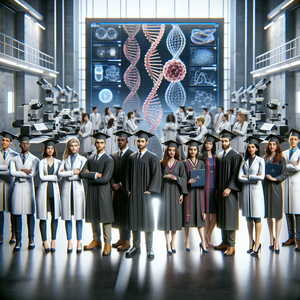
Unlocking Your Future: Exciting Career Paths with a Biomedical Sciences Degree
In recent years, the field of biomedical sciences has witnessed remarkable growth, offering graduates a broad spectrum of career opportunities. If you're considering a major in Biomedical Sciences, you'll find that this degree not only opens up traditional roles like biomedical engineers and medical technologists but also paves the way into innovative sectors such as medical writing and regulatory affairs.
Job Summaries:
Biomedical Scientist:
- Biomedical Scientists play a pivotal role in diagnosing and treating diseases by analyzing biological samples.
- Their work in conducting experiments and interpreting data can significantly influence patient outcomes.
- Generally, a degree in biomedical science is a prerequisite, underscoring the importance of this role in health management.
Clinical Research Associate:
- These professionals oversee clinical trials, ensuring compliance with regulatory standards.
- They gather data and communicate with regulatory bodies, thus contributing to crucial medical research.
- Strong organizational and communication skills are essential for success in this field.
Forensic Scientist:
- Forensic Scientists apply their biological knowledge to criminal investigations.
- Utilizing techniques such as DNA profiling to analyze evidence.
- This role highlights the fascinating intersection of biomedical sciences and law enforcement.
Biomedical Engineer:
- Biomedical Engineers focus on designing and developing medical devices that improve patient care.
- This innovative career demands creativity and problem-solving abilities.
- Showcasing the potential of biomedical sciences to transform healthcare practices.
Medical Laboratory Technician:
- Medical Laboratory Technicians conduct tests on bodily fluids and tissues.
- They play a fundamental role in disease diagnosis.
- Attention to detail and strong technical skills are critical in this profession.
- The profession emphasizes the direct contributions of biomedical sciences to patient health.
Regulatory Affairs Specialist:
- These specialists ensure that pharmaceuticals and medical devices comply with regulations.
- Preparing documentation for necessary submissions.
- This career path highlights the importance of biomedical expertise in ensuring healthcare safety and efficacy.
Genetic Counselor:
- Genetic Counselors evaluate family histories and risk factors for genetic conditions.
- They offer vital information and support.
- This role emphasizes the growing relevance of genetics in personal health decisions.
Biostatistician:
- Biostatisticians use statistical methods to analyze health-related data.
- They aid in study design and interpretation.
- A master's degree is often required.
- This reflects the analytical rigor necessary in biomedical research.
Pharmaceutical Sales Representative:
- These professionals promote medications to healthcare providers.
- Requiring excellent interpersonal skills and a solid grasp of pharmaceutical science.
- This role illustrates the crossover between science and business.
- Showcasing the versatility of biomedical education.
Toxicologist:
- Toxicologists investigate the effects of chemicals on living organisms.
- They frequently work within research or regulatory agencies.
- This profession underscores the vital role of biomedical sciences in public health.
Medical Science Liaison:
- Acting as a bridge between pharmaceutical companies and healthcare professionals.
- Medical Science Liaisons provide crucial scientific information about products.
- This role often demands advanced degrees and strong communication skills.
- Strong communication skills are necessary to convey medical advancements effectively.
Health Policy Analyst:
- Health Policy Analysts assess and develop policies aimed at enhancing healthcare systems.
- Their contributions can significantly influence healthcare delivery, demonstrating the broader societal impact of biomedical knowledge.
Microbiologist:
- Microbiologists study microorganisms and their effects on health and the environment.
- This role is essential for public health and disease prevention, requiring a solid grounding in biological sciences.
Clinical Data Manager:
- Clinical Data Managers oversee data collection and management in clinical trials.
- They ensure accuracy and compliance.
- Their work is crucial for maintaining research integrity.
Biophysicist:
- Biophysicists investigate the physical principles governing biological processes.
- They often contribute to research that uncovers molecular mechanisms of life.
Occupational Health Specialist:
- Evaluate health and safety risks in the workplace
- Design programs to prevent occupational diseases
- Apply biomedical knowledge to promote overall health
Biological Photographer:
- Combining artistry with science
- Biological Photographers capture images of biological subjects for research and education
- Highlighting the importance of visual communication in scientific endeavors
Environmental Scientist:
- Environmental Scientists conduct field research
- Study conditions affecting human health
- Address critical environmental health issues through a biomedical lens.
Dietitian:
- Dietitians focus on nutrition and dietary planning.
- Helping individuals make informed food choices.
- Food choices positively affect health.
- Biomedical sciences guide personal health decisions.
Medical Writer:
- Medical Writers craft clear and concise documents
- They communicate complex medical information
- They play an essential role in the pharmaceutical and medical industries.
The array of career opportunities available to biomedical sciences graduates highlights the significant influence of this field across diverse sectors. From healthcare to research and policy, these professionals drive advancements in medicine and public health. Graduates are encouraged to explore the multitude of options, leveraging their skills and interests to create fulfilling careers in an ever-evolving landscape. As the demand for skilled professionals in biomedical sciences continues to rise, staying updated on industry trends and job market projections will be vital for aspiring graduates. Whether engaging in hands-on research, clinical practice, or shaping health policy, a degree in biomedical sciences offers a pathway to a rewarding and impactful career. Each journey is unique, and the possibilities are boundless—your future in biomedical sciences is waiting to be discovered.
Explore More Jobs

